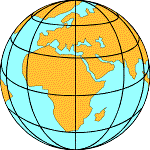 Conservation International
was founded by a group of Nature Conservancy staff who felt that NC's
international program was ineffective. CI pioneered "debt-for-nature"
swaps in developing countries. They are characterized by top-notch staff and
heavy involvement of local people in the design and operation of their programs.
They are very involved in the development of national parks in rainforests
around the world. High in scientific competency and conservation sophistication.
Conservation International
was founded by a group of Nature Conservancy staff who felt that NC's
international program was ineffective. CI pioneered "debt-for-nature"
swaps in developing countries. They are characterized by top-notch staff and
heavy involvement of local people in the design and operation of their programs.
They are very involved in the development of national parks in rainforests
around the world. High in scientific competency and conservation sophistication.
 The Wildlife Conservation
Society (headquartered at the Bronx Zoo). This group publishes Wildlife
Conservation magazine, probably the best publication for the general public
about international conservation issues. The effort focuses on wildlife research
efforts in the developing world. Leaders include George Schaller and his field
studies on pandas and Tibetan wildlife, and Alan Rabinowitz and his studies on
jaguars in Belize and various big cats in southeast Asia.
The Wildlife Conservation
Society (headquartered at the Bronx Zoo). This group publishes Wildlife
Conservation magazine, probably the best publication for the general public
about international conservation issues. The effort focuses on wildlife research
efforts in the developing world. Leaders include George Schaller and his field
studies on pandas and Tibetan wildlife, and Alan Rabinowitz and his studies on
jaguars in Belize and various big cats in southeast Asia.
 American Cetacean Society
This national group has been the leader in education and conservation regarding
cetaceans (whales and dolphins) for 30 years. They form a very successful link
between scientists, government officials, and lay conservationists. ACS' local
Monterey Chapter is the best
source of information about whales and dolphins in this part of California.
American Cetacean Society
This national group has been the leader in education and conservation regarding
cetaceans (whales and dolphins) for 30 years. They form a very successful link
between scientists, government officials, and lay conservationists. ACS' local
Monterey Chapter is the best
source of information about whales and dolphins in this part of California.
 Earthwatch organizes volunteers to assist scientists in
the field on a wide variety of ecology, anthropology, geology, and other
projects around the world. Help science, learn, and get a tax deduction to boot
(in the U.S.)! The science is real, and the very high rate of repeat customers
suggests to me that they are doing a good job.
Earthwatch organizes volunteers to assist scientists in
the field on a wide variety of ecology, anthropology, geology, and other
projects around the world. Help science, learn, and get a tax deduction to boot
(in the U.S.)! The science is real, and the very high rate of repeat customers
suggests to me that they are doing a good job.
 The
International
Crane Foundation in Baraboo, Wisconsin has a remarkable record of
conservation success worldwide regarding these magnificent endangered birds.
Their devotion to cranes has been so obvious that it penetrates political
boundaries and ideologies and allows ICF biologists to get countries like
Afghanistan, Iran, Russia and China to all work together for the common goal of
saving these migratory birds.
The
International
Crane Foundation in Baraboo, Wisconsin has a remarkable record of
conservation success worldwide regarding these magnificent endangered birds.
Their devotion to cranes has been so obvious that it penetrates political
boundaries and ideologies and allows ICF biologists to get countries like
Afghanistan, Iran, Russia and China to all work together for the common goal of
saving these migratory birds.
 Wildlife Preservation Trust
International This is the American branch of the late Gerald Durrell's Group
with its
Zoo on the
Isle of Jersey, England. The WPTI has been a leader in captive breeding of
endangered species while other zoos kept taking their animals from the wild. (I
also highly recommend as extremely engaging and amusing Durrell's most recent
book, The Aye-Aye and I about his last trip to Madagascar.
Wildlife Preservation Trust
International This is the American branch of the late Gerald Durrell's Group
with its
Zoo on the
Isle of Jersey, England. The WPTI has been a leader in captive breeding of
endangered species while other zoos kept taking their animals from the wild. (I
also highly recommend as extremely engaging and amusing Durrell's most recent
book, The Aye-Aye and I about his last trip to Madagascar.
 The
The

